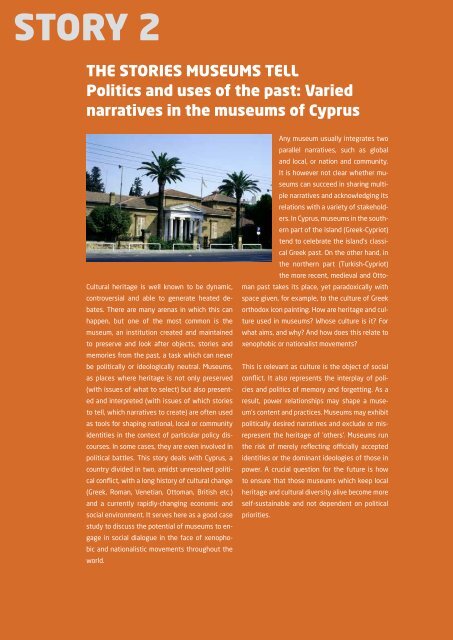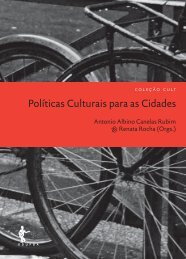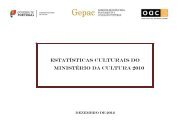Culture in for and as Sustainable Development
YIGflg
YIGflg
Create successful ePaper yourself
Turn your PDF publications into a flip-book with our unique Google optimized e-Paper software.
STORY 2<br />
THE STORIES MUSEUMS TELL<br />
Politics <strong>and</strong> uses of the p<strong>as</strong>t: Varied<br />
narratives <strong>in</strong> the museums of Cyprus<br />
26<br />
Cultural heritage is well known to be dynamic,<br />
controversial <strong>and</strong> able to generate heated debates.<br />
There are many aren<strong>as</strong> <strong>in</strong> which this can<br />
happen, but one of the most common is the<br />
museum, an <strong>in</strong>stitution created <strong>and</strong> ma<strong>in</strong>ta<strong>in</strong>ed<br />
to preserve <strong>and</strong> look after objects, stories <strong>and</strong><br />
memories from the p<strong>as</strong>t, a t<strong>as</strong>k which can never<br />
be politically or ideologically neutral. Museums,<br />
<strong>as</strong> places where heritage is not only preserved<br />
(with issues of what to select) but also presented<br />
<strong>and</strong> <strong>in</strong>terpreted (with issues of which stories<br />
to tell, which narratives to create) are often used<br />
<strong>as</strong> tools <strong>for</strong> shap<strong>in</strong>g national, local or community<br />
identities <strong>in</strong> the context of particular policy discourses.<br />
In some c<strong>as</strong>es, they are even <strong>in</strong>volved <strong>in</strong><br />
political battles. This story deals with Cyprus, a<br />
country divided <strong>in</strong> two, amidst unresolved political<br />
conflict, with a long history of cultural change<br />
(Greek, Roman, Venetian, Ottoman, British etc.)<br />
<strong>and</strong> a currently rapidly-chang<strong>in</strong>g economic <strong>and</strong><br />
social environment. It serves here <strong>as</strong> a good c<strong>as</strong>e<br />
study to discuss the potential of museums to engage<br />
<strong>in</strong> social dialogue <strong>in</strong> the face of xenophobic<br />
<strong>and</strong> nationalistic movements throughout the<br />
world.<br />
Any museum usually <strong>in</strong>tegrates two<br />
parallel narratives, such <strong>as</strong> global<br />
<strong>and</strong> local, or nation <strong>and</strong> community.<br />
It is however not clear whether museums<br />
can succeed <strong>in</strong> shar<strong>in</strong>g multiple<br />
narratives <strong>and</strong> acknowledg<strong>in</strong>g its<br />
relations with a variety of stakeholders.<br />
In Cyprus, museums <strong>in</strong> the southern<br />
part of the isl<strong>and</strong> (Greek-Cypriot)<br />
tend to celebrate the isl<strong>and</strong>’s cl<strong>as</strong>sical<br />
Greek p<strong>as</strong>t. On the other h<strong>and</strong>, <strong>in</strong><br />
the northern part (Turkish-Cypriot)<br />
the more recent, medieval <strong>and</strong> Ottoman<br />
p<strong>as</strong>t takes its place, yet paradoxically with<br />
space given, <strong>for</strong> example, to the culture of Greek<br />
orthodox icon pa<strong>in</strong>t<strong>in</strong>g. How are heritage <strong>and</strong> culture<br />
used <strong>in</strong> museums? Whose culture is it? For<br />
what aims, <strong>and</strong> why? And how does this relate to<br />
xenophobic or nationalist movements?<br />
This is relevant <strong>as</strong> culture is the object of social<br />
conflict. It also represents the <strong>in</strong>terplay of policies<br />
<strong>and</strong> politics of memory <strong>and</strong> <strong>for</strong>gett<strong>in</strong>g. As a<br />
result, power relationships may shape a museum’s<br />
content <strong>and</strong> practices. Museums may exhibit<br />
politically desired narratives <strong>and</strong> exclude or misrepresent<br />
the heritage of ‘others’. Museums run<br />
the risk of merely reflect<strong>in</strong>g officially accepted<br />
identities or the dom<strong>in</strong>ant ideologies of those <strong>in</strong><br />
power. A crucial question <strong>for</strong> the future is how<br />
to ensure that those museums which keep local<br />
heritage <strong>and</strong> cultural diversity alive become more<br />
self-susta<strong>in</strong>able <strong>and</strong> not dependent on political<br />
priorities.




